Enterprise Information Management (EIM)?: What it EIM Meaning & EIM Systems
Discover what is Enterprise Information Management (EIM) and why it’s essential for modern businesses. Learn about EIM meaning, information management solutions, EIM systems, and how EIM software supports the management of enterprise data at scale.
- What is Enterprise Information Management (EIM)?
- Definition of EIM
- Importance in Modern Organizations
- What is EIM?
- EIM System Overview
- Why Choose Workdo for Enterprise Information Management?
- EIM vs Traditional Information Management
- Core Concepts of Information Management
- Strategic Role of EIM in Enterprises
- Frequently Asked Questions
What is Enterprise Information Management (EIM)?
Enterprise Information Management (EIM) refers to the comprehensive system and strategies used by organizations to collect, manage, and utilize information effectively. The meaning of EIM lies in its ability to unify various information management disciplines — such as data governance, content management, and business intelligence — into a cohesive framework.
An effective EIM system ensures that information is accurate, secure, and accessible across the entire enterprise. It supports decision-making processes by providing timely and relevant information for management at all levels. With the increasing volume and complexity of data, organizations rely on EIM solutions to handle their information assets efficiently.
EIM plays a vital role in the management of enterprise data, enabling organizations to streamline operations, improve compliance, and gain a competitive edge in today’s data-driven business environment.
In today’s fast-paced digital economy, data is more than just information—it’s an asset. Enterprise Information Management (EIM) is the structured approach to optimizing how enterprises capture, store, manage, and use data across all departments. For platforms like Workdo.io’s EIM, which deliver comprehensive software solutions, EIM enables users to unlock the full value of their data while maintaining governance and compliance.
Definition of EIM
EIM is a strategic system that enables organizations to efficiently manage their information assets across all departments and processes. The meaning of EIM lies in its ability to unify and streamline data collection, storage, governance, and sharing to ensure accuracy, security, and accessibility.
For online software platforms like Workdo’s EIM plays a critical role by offering integrated information management solutions that centralize workflows, documents, and communication in one digital environment. These platforms act as an EIM system by providing tools that support the management of enterprise information—helping businesses reduce data silos, enhance collaboration, and improve decision-making.
By leveraging such EIM-enabled online software, companies can optimize their information in management, automate routine processes, and maintain enterprise-level control over their data—all while supporting remote and hybrid work models.
Importance in Modern Organizations
In today’s fast-paced digital world, Enterprise Information Management (EIM) has become essential for modern organizations striving to stay competitive and agile. The meaning of EIM goes beyond just managing data—it’s about creating an integrated system that enables efficient handling of information for management across all levels.
Modern enterprises generate vast amounts of data daily from multiple sources, making it critical to have robust information management solutions. EIM systems help organizations organize, secure, and govern this information, ensuring that decision-makers have timely access to accurate data.
By adopting EIM, companies can improve operational efficiency, enhance customer experiences, and maintain regulatory compliance. Effective information management services also reduce risks associated with data breaches or loss, while facilitating innovation by making information accessible and actionable.
Platforms like Workdo.io exemplify how online software solutions can implement EIM principles, providing centralized tools to manage enterprise information seamlessly. Ultimately, EIM is a cornerstone for businesses seeking to harness the full potential of their information assets and drive sustainable growth in a digital economy.
What is EIM?
Enterprise Information Management (EIM) is a strategic approach that combines systems, processes, and technologies to manage an organization’s information assets. The meaning of EIM extends beyond just storing data—it ensures that information is accurate, accessible, secure, and used effectively across the enterprise.
An EIM system integrates various information sources and tools, including content management, data governance, business intelligence, and workflow automation. The goal is to improve how information in management is handled, enabling better decisions, regulatory compliance, and operational efficiency.
In short, the meaning of Enterprise Information Management lies in turning raw data into useful insights through an integrated system that supports both business and IT needs.
EIM System Overview
An Enterprise Information Management (EIM) system is a comprehensive framework designed to manage the entire lifecycle of information within an organization. The meaning of an EIM system involves integrating diverse information management functions—such as data storage, governance, content management, and analytics—into a unified platform.
This system supports the management of enterprise-wide information by enabling seamless data flow, reducing redundancies, and ensuring data accuracy and security. EIM systems provide organizations with the tools to implement information management solutions that streamline workflows, improve collaboration, and enhance decision-making.
Modern EIM systems often include components like document management, records management, metadata management, and business intelligence. Platforms like Workdo.io offer cloud-based EIM systems, delivering scalable and accessible solutions that adapt to enterprise needs.
By implementing a robust EIM system, organizations can better control their information assets, comply with regulatory standards, and optimize operational efficiency—turning raw data into valuable business insights.
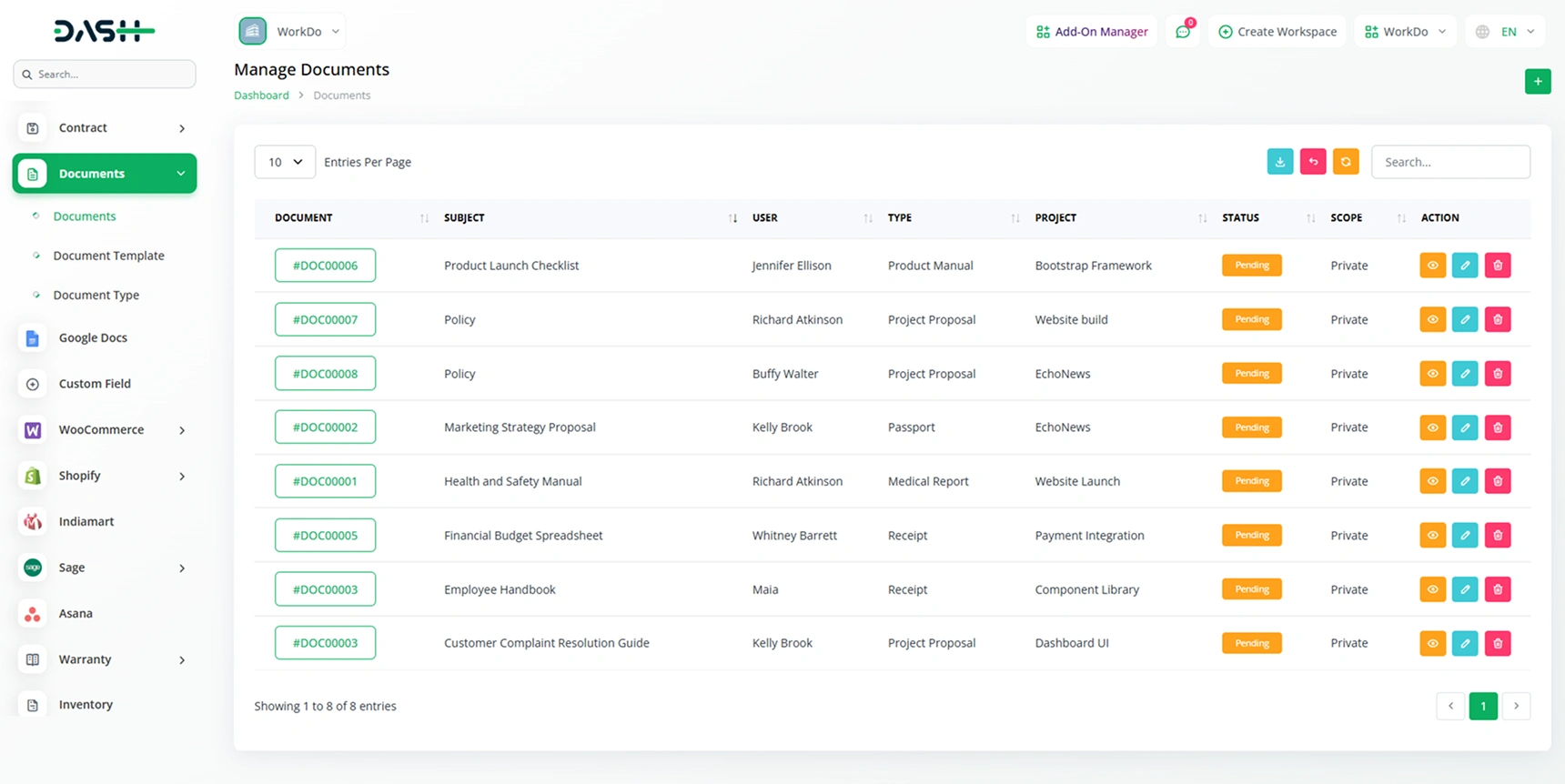
Why Choose Workdo for Enterprise Information Management?
1. All-in-One Integrated Platform
Workdo.io’s provides a comprehensive EIM system that integrates various tools essential for managing enterprise information—from document management, workflow automation, to real-time collaboration. Unlike fragmented solutions, Workdo brings everything under one roof, simplifying information management and eliminating silos.
2. Customizable and Scalable Solutions
Every enterprise is unique, and Workdo’s platform is highly customizable to fit specific business processes and requirements. Whether you are a startup or a large organization, Workdo’s enterprise information management software scales with your growth, supporting complex workflows and data management needs.
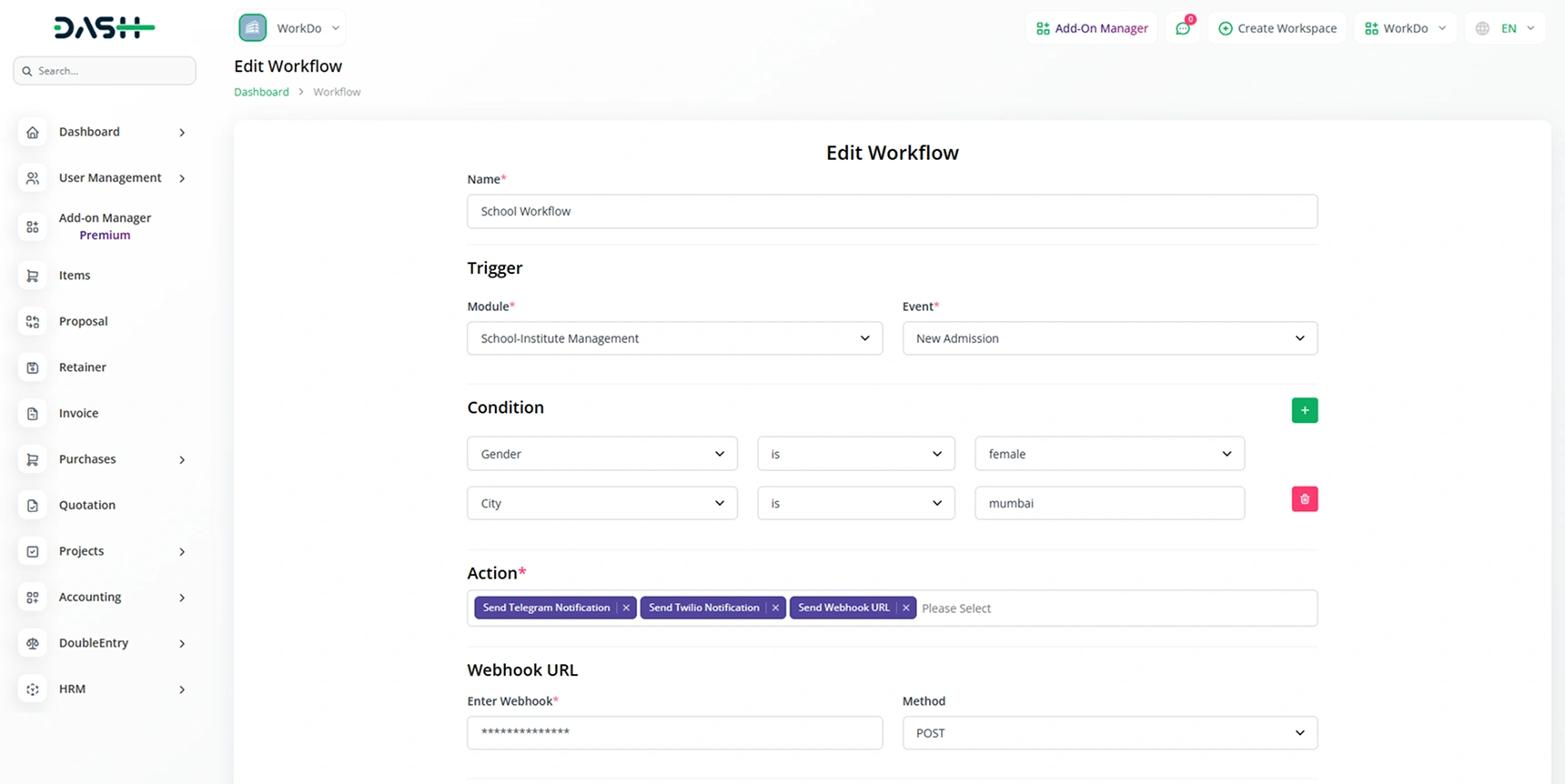
3. Enhanced Collaboration and Communication
Information management is not just about storing data but enabling effective communication. Workdo’s information management solution fosters seamless collaboration across teams and departments, ensuring that everyone has timely access to the right information, enhancing productivity and decision-making.
4. Robust Security and Compliance
Managing enterprise information involves protecting sensitive data. Workdo offers top-tier security features, including role-based access control and data encryption, helping organizations meet regulatory compliance requirements while maintaining data integrity.
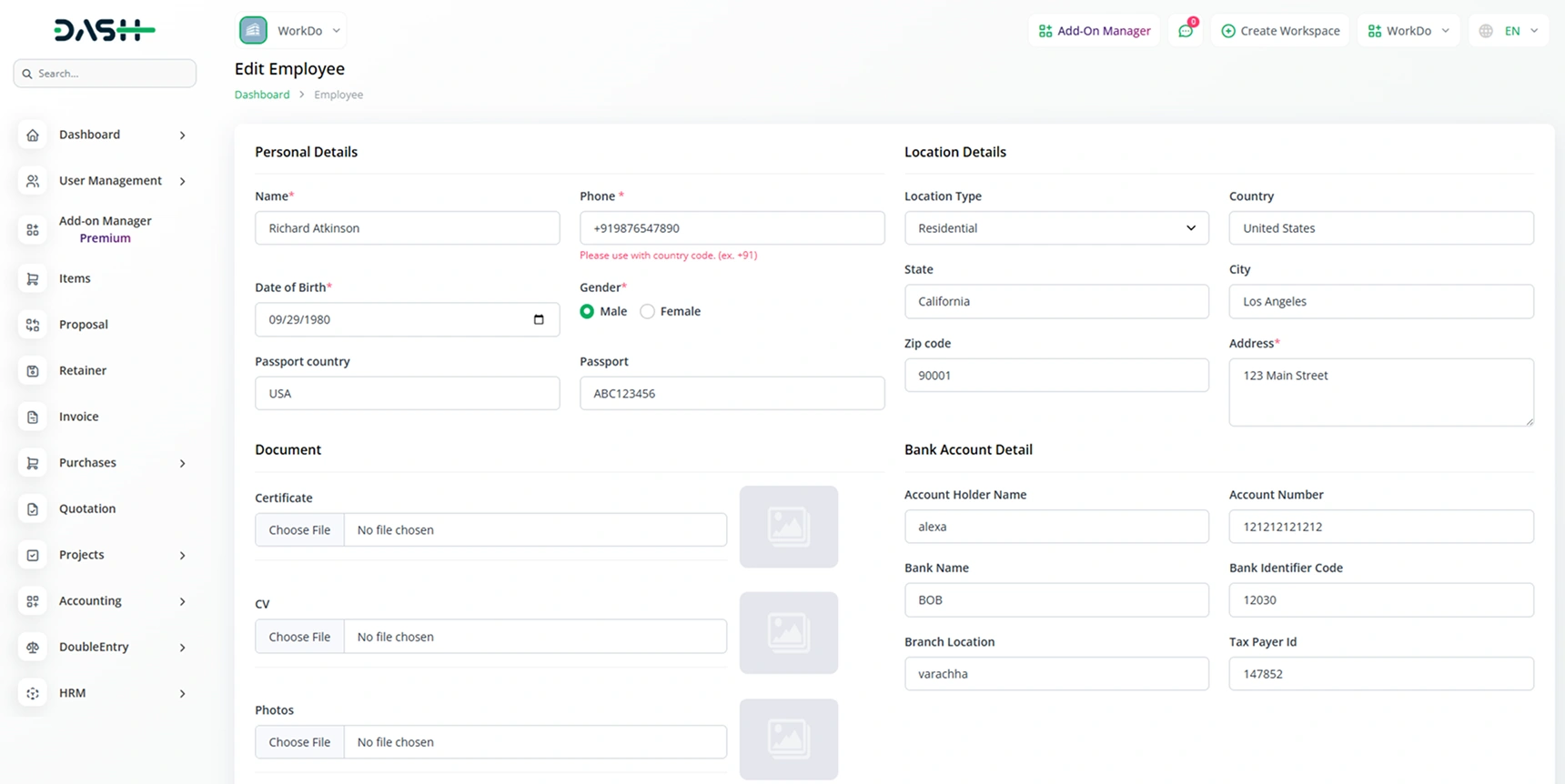
5. User-Friendly Interface
Workdo’s EIM system is designed with usability in mind. Its intuitive dashboard allows users at all levels to navigate and utilize the platform effectively without steep learning curves. This information management software enhances user adoption and reduces training time.
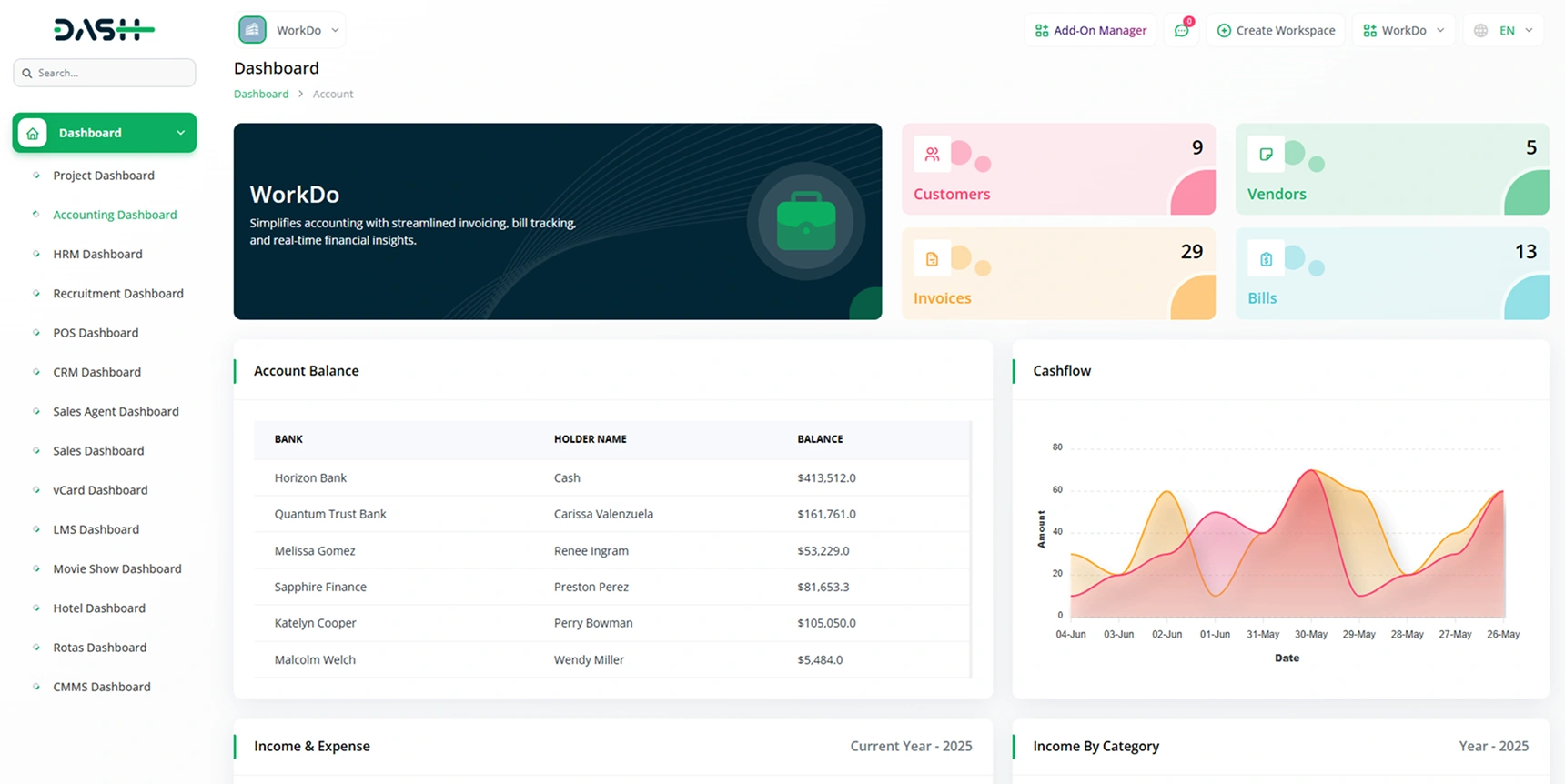
6. Advanced Analytics and Reporting
Workdo’s EIM empowers enterprises with powerful analytics tools, enabling data-driven insights. This helps in monitoring information flows, evaluating process efficiency, and making strategic business decisions based on accurate data.
7. Cloud-Based Accessibility
As a modern enterprise information management solution, Workdo is cloud-based, ensuring that employees can access vital information anytime, anywhere, from any device—critical for today’s remote and hybrid work environments.
8. Continuous Innovation
Workdo continuously evolves by incorporating emerging technologies like AI and automation, enhancing its capabilities to manage enterprise information more intelligently and efficiently.
In summary, choosing Workdo for Enterprise Information Management means opting for a trusted, scalable, secure, and user-friendly platform designed to streamline information flow, enhance collaboration, and drive business growth.
EIM vs Traditional Information Management
Traditional information management often focuses on isolated functions like document storage or basic data processing, lacking integration and strategic oversight. In contrast, EIM systems provide comprehensive information management solutions that unify data from various sources into a single, enterprise-wide platform. This integrated approach enables better governance, improved compliance, and real-time insights, whereas traditional methods may suffer from data silos and inefficiencies.
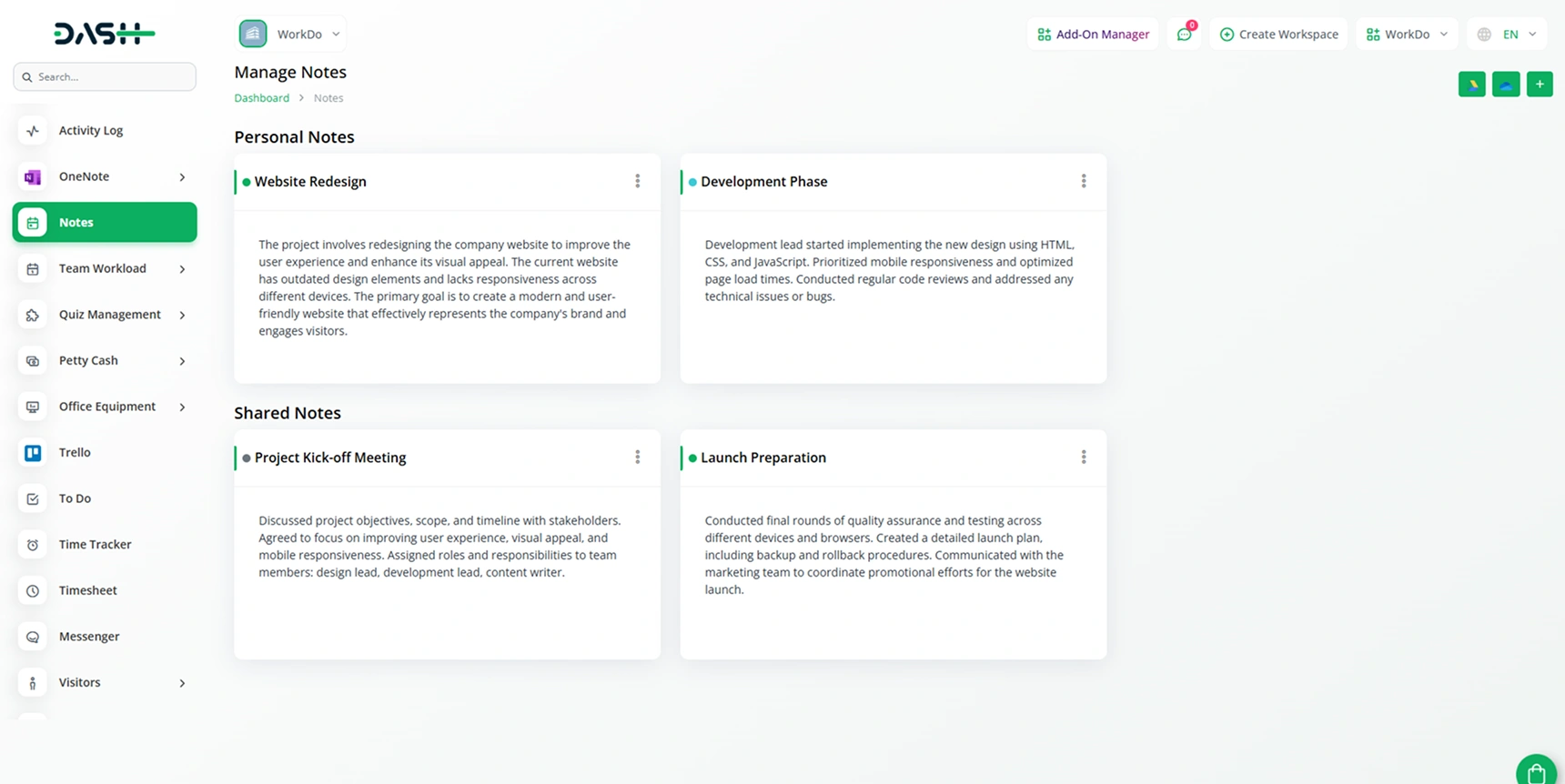
Core Concepts of Information Management
Understanding the core concepts of information management is essential for modern organizations, especially when leveraging online software platforms like Workdo.io that provide robust Enterprise Information Management (EIM) solutions.
What is Information Management?
Information management refers to the systematic collection, organization, storage, and dissemination of data within an organization. It involves processes and tools designed to ensure information is accurate, secure, and easily accessible. In the context of an online platform like Workdo.io, information management is streamlined through cloud-based systems that enable real-time collaboration, centralized document control, and automated workflows, making it easier for enterprises to manage their information assets efficiently.
Role of Information in Management
Information plays a critical role in effective management by providing the foundation for decision-making, strategic planning, and operational efficiency. The role of information in management involves delivering timely and relevant data that managers need to monitor performance, assess risks, and identify opportunities. Platforms like Workdo.io’s EIM enhance this role by offering integrated information management solutions that connect people and processes, enabling enterprises to leverage their information for better business outcomes and agile responses to market changes.
Strategic Role of EIM in Enterprises
Enterprise Information Management (EIM) plays a critical strategic role in modern organizations by providing a unified framework for the management of enterprise information assets. The eim meaning extends beyond simple data handling to encompass an integrated eim system that supports efficient information for management and decision-making at the enterprise level.
Management Enterprise Concepts
The concept of management enterprise revolves around organizing, governing, and optimizing information across all business units. Effective EIM systems combine various information management solutions—including information management software and information management services—to ensure seamless access, security, and governance of enterprise data. Understanding what is enterprise information system and what are enterprise information systems helps businesses deploy eim solutions that unify data silos and enable better operational control.
Benefits of Implementing EIM
Implementing a comprehensive eim solution offers several advantages for enterprises, such as:
- Improved data accuracy and security through integrated enterprise information management software
- Enhanced compliance with regulations using robust governance models
- Increased operational efficiency by consolidating data and automating workflows with an advanced eim system
- Better decision-making by leveraging timely, accurate information in management
- Significant cost savings via optimized lifecycle management of enterprise information
- Greater agility and innovation supported by actionable insights derived from unified information
For organizations seeking authoritative knowledge, the journal of enterprise information management offers valuable insights on best practices and emerging trends. By understanding what is information management and embracing tailored information management solutions, businesses can define their information strategy and maintain a competitive edge.
In summary, what is enterprise information management and its proper implementation through effective information management software is essential for driving growth and sustainability in today’s data-driven economy.
📌 Frequently Asked Questions (FAQs)
Reach Out to Us
Have questions or need assistance? We're here to help! Reach out to our team for support, inquiries, or feedback. Your needs are important to us, and we’re ready to assist you!


Need more help?
If you’re still uncertain or need professional guidance, don’t hesitate to contact us. You can contact us via email or submit a ticket with a description of your issue. Our team of experts is always available to help you with any questions. Rest assured that we’ll respond to your inquiry promptly.
Love what you see?
Do you like the quality of our products, themes, and applications, or perhaps the design of our website caught your eye? You can have similarly outstanding designs for your website or apps. Contact us, and we’ll bring your ideas to life.
